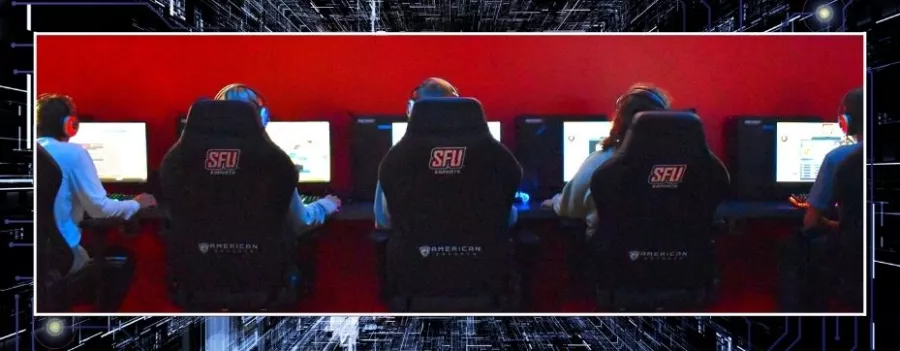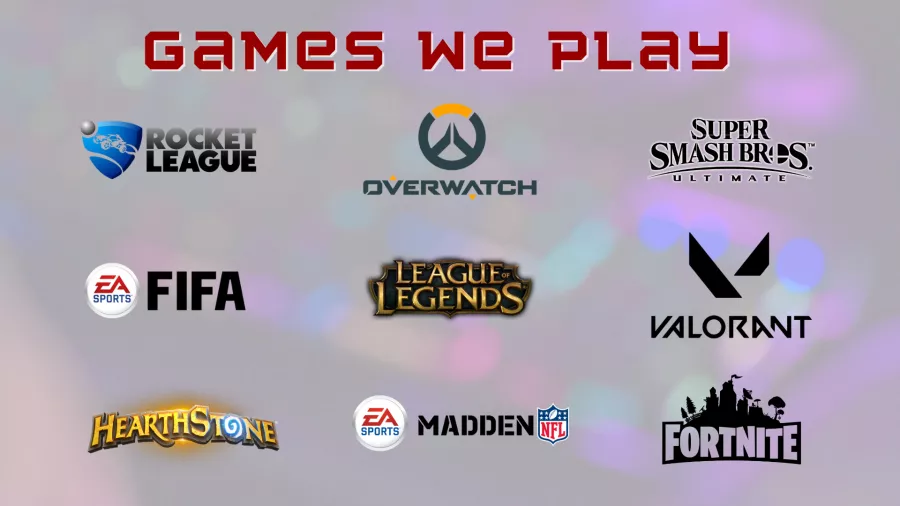Esports
CLUBS & ORGANIZATIONS
Pursue your passion. Join SFU at the top of the leaderboard.
Unleash your ultimate, byte back, and level up your gaming skills. Join the college Esports program that set the pace for all other collegiate programs.
Levels of gaming available for YOUR participation!
-
Intercollegiate competitive: Varsity level competition against other institutions under the University’s name/brand requiring high-level talent and dedication to the sport; requires eligibility/clearance through the National Association of Collegiate Esports (NACE) and competes in the Eastern College Athletic Conference (ECAC).
-
Intramural: Teams comprised of SFU students, faculty, and staff who compete exclusively against other SFU intramural teams through various on-campus matches and tournaments; available to gamers of any level.
-
Recreational: Open-play format for casual gaming, socialization, and entertainment; available to gamers of any level.

GETTING STARTED
Recruiting Players of ALL Skill Levels!
Saint Francis University specializes in the holistic development of students and preparing them for success in both their personal and professional lives...SFU Esports is but another pathway for students to optimize their SFU experience!
SFU GAMING ARENA
A space designed with your gaming needs in mind.
The Luke Trotz Esports Arena is a very exciting addition to the newly renovated lower-level JFK Student Center, which also features a new food court, conference rooms, a bookstore, and more! The space was designed through contributions from American Esports and the architectural designs of Kimmel-Bogrette, who created the renovation designs for the JFK Student Center.
Inside the Luke Trotz Esports Arena, you will find:
-
18 professional-grade gaming PCs
- 1 Playstation 5
- 1 Xbox Series X
-
3 Nintendo Switches
-
Custom leather gaming chairs
-
Professional-grade equipment such as towers, monitors, headsets, mice, and keyboards
- 1-Gbps shielded Cat-6 Ethernet connection
- Climate-controlled arena with Bluetooth-controlled RGB lighting
Our central command hub allows for live streams for viewers, fans, and subscribers to follow the team's competitions as well as allow the space to work as a lounge and observatory for our players to tune in and check out the action coming from other high schools, college, and professional teams and leagues.

The Saint Francis University Esports team is constantly mixing up the games we play. Check below for the games we are actively competing in or visit the Esports team page.

FAQ'S
Learn more about the Esports program.
You have questions, we have answers! Dive deeper into the Esports program at SFU to see if it's the right fit for you.
-
What are Esports?
According to Gaming.net:
Esports, or if you prefer, electronic sports, refer to professional-level electronic game competitions broadcast to a legion of fans around the world. These games are played individually or in teams via the internet and networked computers. Esports are competitive modalities played in games like League of Legends and Counter-Strike.
All of this, at a pace that promises to move until the year 2022 the sum of 3 billion dollars. Gigantic numbers for a gigantic machine that competes for attention with other traditional sports. Demanding the same level of training and commitment from their pantheon of athletes.
-
Is there an Esports club, or just an inter-collegiate competitive team?
There is currently have a very active gaming club on campus that provides opportunities for their members and other students to game recreationally and through intramural tournaments.
They are an important partner with the esports program and will continue to be throughout the program’s continued growth and development.
The current gaming club is more of a social/recreational club on campus so while there will be many opportunities to collaborate on events, SFU Esports as a program does look and feel a bit different with different levels of participation.
-
Does SFU have any affiliations with professional Esports teams?
SFU does not have any affiliations with professional esports teams, however, our partnership with American Esports certainly brings SFU into the massive esports industry on a number of different levels including media, business, technology, and professional gaming, as well.
Additionally, the proximity of both the Pittsburgh Knights organization as well as the Philadelphia Fusion Overwatch team should provide us some opportunities to make even more direct connections to the world of professional gaming.
-
How will involvement in Esports at SFU make me a better student?
Esports as a whole is really proving contrary to the misnomer that gamers are introverts or antisocial. Research is consistently finding that esports athletes are incredibly social and very engaged within their schools and communities. The platform of esports has allowed students to bring their interests and passions and share them with their peers and with the community at large. There's a reason why the viewership of major esports tournaments and championships is now rivaling, and in some cases, even surpassing those of traditional professional sporting events. So from an engagement and socialization level, esports is going to connect students and communities like never before.
SFU has an incredible following from both the athletics world as well as the academic and professional world, as mentioned before, with the success and popularity of our programs; Esports will only add another layer to the student- and campus-experience that will connect students to more of their peers and to more opportunities to help further their growth and development as people of character, integrity, service, and intellectual and professional ability.
Finally, esports has developed connections and applications to many academic fields and industries with emerging trends in technological advancements in health and medicine, sciences, education and business. Our long-term plan is to ensure that SFU Esports is fully integrated into the robust academic curriculum as well. There are many examples of other collegiate esports programs being integrated into fields like special education, healthcare, business and business analytics, marketing and communications, and of course STEAM (science, technology, engineering, arts, and mathematics).
Students participating in SFU Esports will also develop effective communication, team work, and problem solving abilities. The game titles that are chosen to be played as part of our program have been chosen specifically because they involve a higher level of strategy in completing complex objectives. These games titles require athletes to communicate with each other about what is happening on their screen at all times as each player can only view a fixed perspective of the entire gameplay map, collaborate with each other to maintain their team's strategy, and think critically to find solutions to best their opponent's strategy.
-
I want to make a career out of gaming. What academic programs does SFU have for me?
Professional gaming does not require any specific major or field of study. Anyone, with any degree, who possesses extraordinary talent and passion for gaming has the potential to move beyond collegiate gameplay into the professional arena.
Through American Esports, students will have internships and mentoring opportunities within the wider world of esports to include broadcasting, marketing, digital communications and media, business management, opportunities in technology and game-center development, and much more.
Additionally, with the surge in technological advances with things like artificial intelligence, virtual reality, analytics, and expanding applications in tele-medicine and tele-communications, there are a number of pathways to connect the world of gaming to an array of professional careers.
According to Gaming.net:
Esports, or if you prefer, electronic sports, refer to professional-level electronic game competitions broadcast to a legion of fans around the world. These games are played individually or in teams via the internet and networked computers. Esports are competitive modalities played in games like League of Legends and Counter-Strike.
All of this, at a pace that promises to move until the year 2022 the sum of 3 billion dollars. Gigantic numbers for a gigantic machine that competes for attention with other traditional sports. Demanding the same level of training and commitment from their pantheon of athletes.
There is currently have a very active gaming club on campus that provides opportunities for their members and other students to game recreationally and through intramural tournaments.
They are an important partner with the esports program and will continue to be throughout the program’s continued growth and development.
The current gaming club is more of a social/recreational club on campus so while there will be many opportunities to collaborate on events, SFU Esports as a program does look and feel a bit different with different levels of participation.
SFU does not have any affiliations with professional esports teams, however, our partnership with American Esports certainly brings SFU into the massive esports industry on a number of different levels including media, business, technology, and professional gaming, as well.
Additionally, the proximity of both the Pittsburgh Knights organization as well as the Philadelphia Fusion Overwatch team should provide us some opportunities to make even more direct connections to the world of professional gaming.
Esports as a whole is really proving contrary to the misnomer that gamers are introverts or antisocial. Research is consistently finding that esports athletes are incredibly social and very engaged within their schools and communities. The platform of esports has allowed students to bring their interests and passions and share them with their peers and with the community at large. There's a reason why the viewership of major esports tournaments and championships is now rivaling, and in some cases, even surpassing those of traditional professional sporting events. So from an engagement and socialization level, esports is going to connect students and communities like never before.
SFU has an incredible following from both the athletics world as well as the academic and professional world, as mentioned before, with the success and popularity of our programs; Esports will only add another layer to the student- and campus-experience that will connect students to more of their peers and to more opportunities to help further their growth and development as people of character, integrity, service, and intellectual and professional ability.
Finally, esports has developed connections and applications to many academic fields and industries with emerging trends in technological advancements in health and medicine, sciences, education and business. Our long-term plan is to ensure that SFU Esports is fully integrated into the robust academic curriculum as well. There are many examples of other collegiate esports programs being integrated into fields like special education, healthcare, business and business analytics, marketing and communications, and of course STEAM (science, technology, engineering, arts, and mathematics).
Students participating in SFU Esports will also develop effective communication, team work, and problem solving abilities. The game titles that are chosen to be played as part of our program have been chosen specifically because they involve a higher level of strategy in completing complex objectives. These games titles require athletes to communicate with each other about what is happening on their screen at all times as each player can only view a fixed perspective of the entire gameplay map, collaborate with each other to maintain their team's strategy, and think critically to find solutions to best their opponent's strategy.
Professional gaming does not require any specific major or field of study. Anyone, with any degree, who possesses extraordinary talent and passion for gaming has the potential to move beyond collegiate gameplay into the professional arena.
Through American Esports, students will have internships and mentoring opportunities within the wider world of esports to include broadcasting, marketing, digital communications and media, business management, opportunities in technology and game-center development, and much more.
Additionally, with the surge in technological advances with things like artificial intelligence, virtual reality, analytics, and expanding applications in tele-medicine and tele-communications, there are a number of pathways to connect the world of gaming to an array of professional careers.